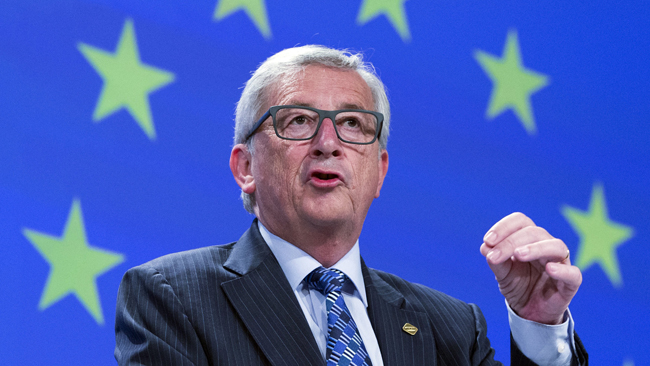Europe has neared a “security union”
Expert: “Creation of a robust military structure will change the nature of the EU and will be a step towards deeper integration”
It seems that the double attack which occurred in Brussels, the heart of Europe on March 22 has finally pushed the EU to create a security union.
In particular, President of the European Commission Jean-Claude Juncker was the first to state the need for such a union if the EU is to be an effective force against terrorism; he made this statement during a joint press conference with Prime Minister of France Manuel Valls.
“We feel we need capital markets union, energy union, economic and monetary union, but we also think that we need a security union,” Juncker said and added that the Commission would come up with proposals for, among other things, the protection of external borders, and he also hoped that the EU countries would adopt them soon. The Commission prepared a proposal for the EU border and coast guard services in December 2015 which should be implemented this fall.
For his part, Valls reiterated France’s requirements in this field: “Systematic border controls in the Schengen area, deployment of European border guards, the urgent need to better fight arms trafficking, the urgent need to adopt a European PNR (Passenger Name Record) system, to enable the tracking of terrorists’ movements.” According to him, all this, after adoption by the EU Council and the European Parliament’s approval, should create a European security pact, which will result in a secure Europe able to intervene on external theaters. “The European Commission, which has made important proposals on this issue, understands well that we must move and move quickly, it also understands well that the very survival of the Schengen Treaty is at stake, and that the EU countries would not appreciate if, despite the difficulties uncovered long ago, we fail to act,” Valls explained. According to him, European decisions are being hampered and populism scores wins because the EU’s words are often not translated into deeds. “If Europe fails to retake control of itself, it risks a breakup, and we all will be to blame for it,” the head of the French government warned.
Juncker’s idea was supported at once by Italian Prime Minister Matteo Renzi. In particular, he reminded that Europe had been arguing about a common defense policy since 1954, referring to the creation of the seven-nation Western European Union, a predecessor to the modern 28-nation EU. “Now is the time to finally create a European security program without boundaries. Europe must go all the way this time,” Renzi said while speaking in Rome.
Italian President Sergio Mattarella and other leading Italian politicians echoed Renzi’s observations.
Most experts agree that, indeed, Juncker’s idea reflects a real need, but it is more reactive than proactive, and does nothing to get ahead of the enemy. Many see it as resembling the reaction of the EU and its High Representative for Foreign Affairs and Security Policy Federica Mogherini to the Ukrainian crisis, when they needed a year since the aggression started to begin to create a media strategy to counter Russian propaganda, which is actively used in the EU.
Chairman of the Verkhovna Rada’s Committee on Foreign Affairs Hanna Hopko noted that the idea of a security union was sensible. In her view, the EU has Europol which will now be slowly transformed into a truly interstate police service. Besides, she added, the Schengen Area’s border guards act as a common border service. “There are also other means and tools which should be honed and put to use now,” Hopko remarked.
Senior Vice President at the Center for European Policy Analysis Edward Lucas offered the following comment to The Day about Juncker’s idea: “We need a security union for both internal threats like terrorism and organized crime and for external ones like ISIS and Putin. We should have done it years ago. Now it may be too late.”
German political scientist Andreas Umland also believes that creation of a security union is an overdue step. “The failure of the European Defense Community in the early 1950s was a major setback for European integration. The situation has become more and more odd over the decades as there have appeared more and more countries which are members of the EU or NATO or both, and have only borders with each other. Still, these countries – among them Germany – have national armies while the EU has no proper army, yet a lot of challenges in its foreign relations. The creation of a serious EU military structure would change the character of the EU, and be a step towards deeper integration,” the expert stressed.
“THE NATO ALLIANCE SHOULD DO EVERYTHING TO ADMIT UKRAINE AS SOON AS POSSIBLE”
 Volodymyr OHRYZKO, head of the Center for Russian Studies, former foreign minister of Ukraine:
Volodymyr OHRYZKO, head of the Center for Russian Studies, former foreign minister of Ukraine:
“It is good to see European leaders finally addressing security issues after 25 years of lethargy. They understand that Russia’s attempt to overturn the entire postwar security order is a threat to the security sphere in its entirety. The terrorist threats they face are a manifestation of this. I see a clear cause-and-effect relationship between events happening in the context of terrorist attacks in Europe and preceding developments in Syria, Turkey, and Ukraine. And we all have to understand true causes behind it all.
“Certainly, it would not hurt to have some operational structures that could respond to the challenges existing in the fields of migration, illegal border crossing and so on. But Western countries have a more or less adequate structure that takes care of security issues, which is called NATO. A desire to create some pale or bright copy of it looks somewhat strange today, given that the vast majority of EU countries are also members of NATO. Perhaps Juncker and Valls understand the concept of a security union differently, meaning things such as border control or strengthening anti-terrorism preparedness. But if we talk about global aspects, I see little rationale for it.
“It is obvious that NATO lacks strategy at the moment, not only regarding Ukraine, but also on how to deal with Russia as a country that came close to undermining the postwar order. This is the main problem, and the approach to the Ukrainian issue follows from it. Should the alliance’s policy be centered on containment and punishment of the aggressor, it would reflect one ideology and one future direction of NATO’s development. Should we see a policy of appeasement and giving way to the aggressor, it would be a completely different development path, and a completely different perspective on Ukraine. Victory for the first option means that Ukraine would indeed be seen as a key element of security on the eastern frontier of NATO, and it is precisely in that case that the alliance should do everything to admit Ukraine as soon as possible. If pacifist-neutralist thoughts that today continue to stir in some Western minds will ultimately win, it would mark the beginning of NATO’s decay. For if a defense alliance is unable to defend its values, and we defend their values too, it is doomed to failure. I still hope that just as they have moved past the lethargy that made them fail to see Russia’s actions, we will soon see the West understanding the importance of Ukraine. But this does not mean that we should sit idly, not at all. We, I mean Ukraine, should be as active as possible in informing the Western consumer that Ukraine is their salvation at the present moment.”
Newspaper output №:
№20, (2016)Section
Day After Day





